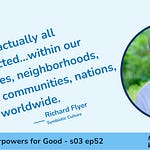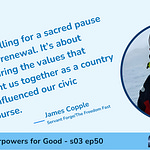Devin: What is your superpower?
Ben: I'm basically the most humble person you've ever met. (Laughs.)
Saving the Great Salt Lake will require “a 30 to 50 percent reduction in our water use in the watershed,” says Dr. Ben Abbott, professor of ecology at Brigham Young University, one of the foremost authorities on the shrinking Great Salt Lake.
This isn’t just a local problem. Not significantly tied to climate change, salt lakes around the globe (about 120 of them) are drying up for the same reason: humans are using the water before it gets to the salt lakes.
AI Summary
1. The Great Salt Lake is a keystone ecosystem.
2. The lake has experienced a significant decline in water levels over the last hundred years.
3. The cause of the decline is mainly due to human water use for agriculture, outdoor vegetation, and mining minerals.
4. Climate change plays a small role in the decline; water consumption accounts for 80 to 90 percent of it.
5. There needs to be a 30 to 50 percent reduction in water use in the watershed to address the problem.
6. Agricultural optimization, urban water use reduction, and targeted fallowing are potential solutions.
7. Alfalfa is a major contributor to water depletion.
8. Farmers must be compensated for reducing water use to remain economically viable.
9. A high percentage, perhaps 95 percent, of indoor water use ends up in the lake.
10. Ben Abbott’s work is focused on understanding and protecting freshwater ecosystems.
Great Salt Lake is a vital part of the ecosystem in Northern Utah. It is the largest of the salt lakes in North America. Losing the lake could create an ecological catastrophe.
Ben explains the problem in simple terms: “Great Salt Lake naturally fluctuates. It goes up and down because there’s no outlet to the ocean. But what we’ve seen over the last hundred years is a very steep decline, a decrease in the water level. This is driven overwhelmingly by one thing, extractive human water use.”
“The breakdown is approximately 80-10-10. So, 80 percent agriculture, 10 percent mineral extraction from the lake, 10 percent municipal water use the urban areas,” he says, summarizing the use of water that once flowed into the lake.
In urban settings, Ben acknowledges that about 95 percent of indoor water uses end up in the lake. After going down the drain, the water is cleaned and flows eventually to where it belongs. The water on urban lawns, however, doesn’t end up in the lake.
In agriculture, “alfalfa is the predominant crop that is using water in the watershed,” Ben says. He suggests paying farmers to fallow their fields for part of the year.
Utah received record-setting snow this past winter; Great Salt Lake has risen several feet. Ben worries this could be a problem. “We can’t get distracted this amazing snow year. It’s the biggest snow year on record. It’s a real gift. It gives us more—maybe a few months more or a year more time to implement these solutions. It doesn’t solve the long-term deficit.”
Interestingly, Ben notes that humans have lived around what is now Great Salt Lake, for about 20,000 years, since long before it was formed by the receding Lake Bonneville. “It was only in the mid-1900s when we had these big federally subsidized dam projects and canal and pipeline projects that we started to overuse, and we created this artificial surplus of water that nobody locally was paying for,” Ben says.
Ben has one overriding concern. “We haven’t come to grips with how serious an issue this is and with how hard the solution is going to be.”
“The lake responds to how much water flows into it; it doesn’t respond to the number of bills that were passed, the number of podcasts that were done on the lake or even the amount of money we spend on it,” he says.
Ben’s superpower is humility. He’s learned to focus on the lakes he cares so much about, not on getting credit for saving them.
How to Develop Humility As a Superpower
Ben has learned to remember some critical context for his work. “It isn’t about us, and it’s not whether our report was taken seriously or if we got credit for the change that was made. It’s focusing on solving the problem.”
That brand of humility is empowering, he says. “When you try to decenter the ego, it becomes a lot easier to take setbacks and criticisms or personal attacks.”
He shared an example to make the point:
I got personally sued for $3 million for the education and research work that we were doing. That was really destabilizing to have my livelihood threatened. But again, I felt really supported thinking about, “Hey, this is really about the lake. This is, of course, disruptive to me and my family for a short period of time. But it may be a step toward permanent protection and better management of the lake.”
Ben offers advice for developing humility by focusing on finding hope and progress.
If you're carrying the weight of the world on your shoulders, and it's just grinding you down, guess what? That's not helping the world, and that's not helping you personally, right? Because you're not going to be in a place that you can have the energy and desire and passion to engage.
So being open to unexpected relationships and conversations, being able to see the beauty in everything around us—there is so much beauty. There are so many reasons to be hopeful about the future and to really work for it.
Hope comes from action, I believe when I sit at home and look at these numbers for the 2,000 to 8,000 premature deaths due to air pollution just here in Utah—that's ten times as many people as die in all car accidents—that can be crushing.
When instead, we're thinking about, “Hey, who can I talk with? Hey, there's this Clean Air caucus in the legislature that's working on this issue. They really care about this issue—bipartisan,” that's where the hope comes in. You start to believe that we can make a difference. And it does.
By focusing on action and progress, hope develops and strengthens your ability to decenter yourself.
As you move forward, follow Ben’s example and advice to develop greater humility, so you can make it a strength that could become a superpower, enabling you to do more good in the world.
Guest-Provided Profile
Ben Abbott (he/him):
Professor of Ecology, The Abbott Lab of Ecosystem Ecology at Brigham Young University
About The Abbott Lab of Ecosystem Ecology at Brigham Young University: We are a research and outreach lab composed of postdoctoral researchers, graduate students, and undergraduates. Since 2017, we have worked on solving some of the most pressing environmental issues regionally and globally, including air pollution, climate change, renewable energy, wildfire, and the conservation of Utah Lake and Great Salt Lake.
Website: benabbott.byu.edu
Twitter Handle: @abbottecology
Other URL: gsl.byu.edu
Biographical Information: Ben Abbott was born in Nashville, Tennessee, and grew up in Orem, Utah. He got interested in science and nature from watching TV and mountain biking in the foothills of Mount Timpanogos. Near the end of his senior year at Orem High, he slipped on a pamphlet for the Quinney Scholarship at Utah State University and applied to the Watershed and Earth Systems Science program. During his B.S., he worked as an undergraduate researcher in northern Alaska, investigating how fish influence nutrient cycles in Arctic lakes. That led to his Ph.D. at the University of Alaska Fairbanks, where he studied permafrost climate feedbacks using interdisciplinary techniques to quantify how Arctic and Boreal ecosystems respond to climate change. After finishing his Ph.D. in 2014, he worked as a Marie Curie postdoctoral fellow at the French National Science Foundation (CNRS). While in western France, he studied the effects of agriculture and urbanization on aquatic and marine ecosystems.
Ben is currently an assistant professor in the Environmental Science & Sustainability program at BYU. He works with a large team of creative and passionate students and postdoctoral researchers to understand and encourage sustainability and reciprocity among all members of the human family and all creation. Specifically, they use methods from ecosystem ecology, evolutionary biology, energy system modeling, and social science to understand and decrease environmental pollution, measure and mitigate the effects of climate change, and protect vulnerable human and nonhuman communities worldwide. He has been married to Rachel Gianni Abbott for twelve years, and they have four children who take after them in their love of animals, TV, and biking. For more information, visit his blog, Approximately Limitless.
Twitter Handle: @thermokarst
Personal Facebook Profile:fb.com/Benabbo
Linkedin: linkedin.com/in/ben-abbott-54437817/
Instagram Handle: instagram.com/sawzalls/













